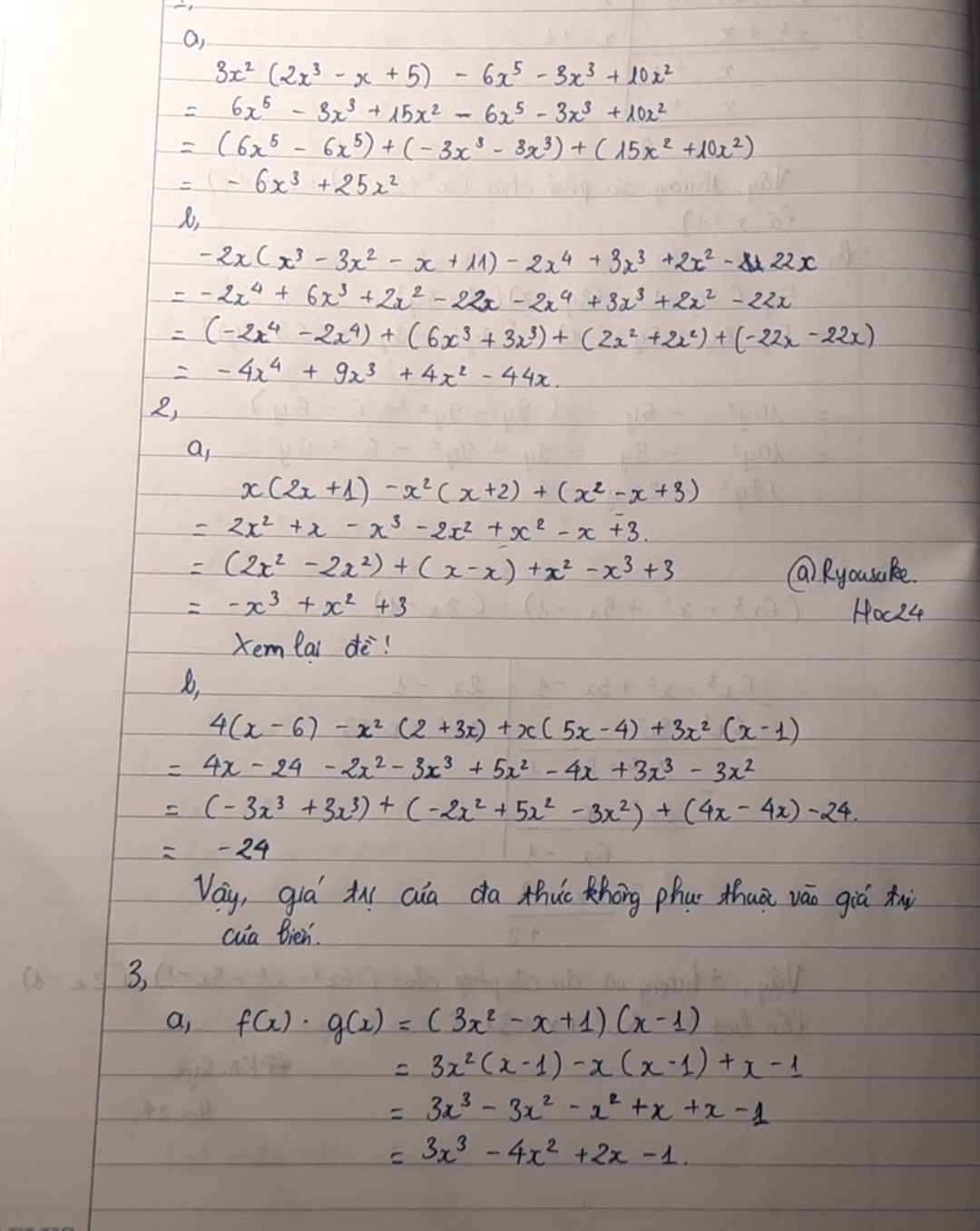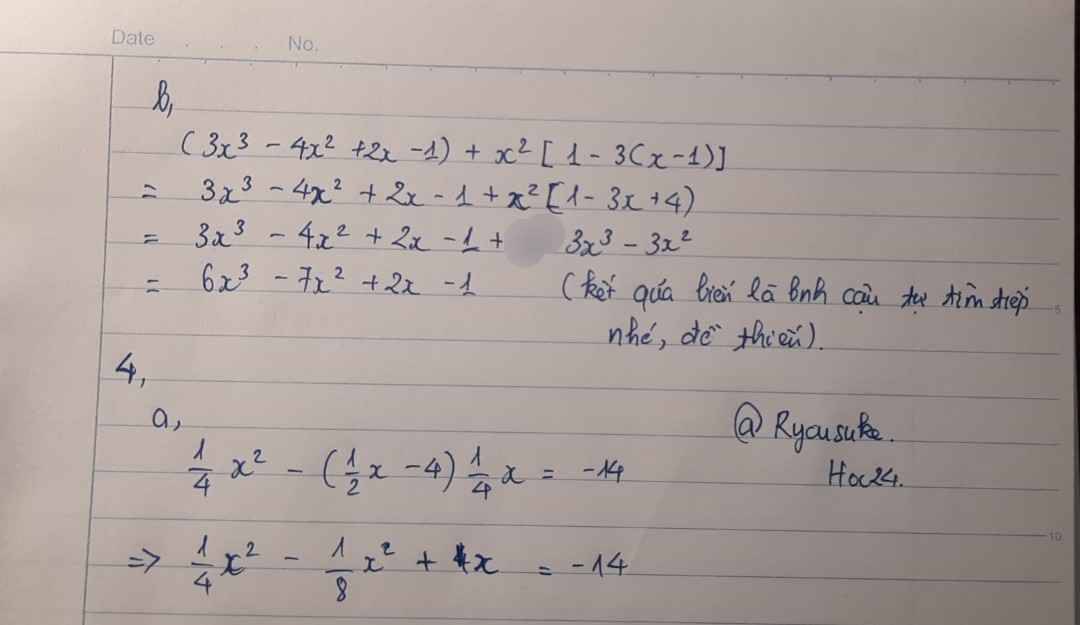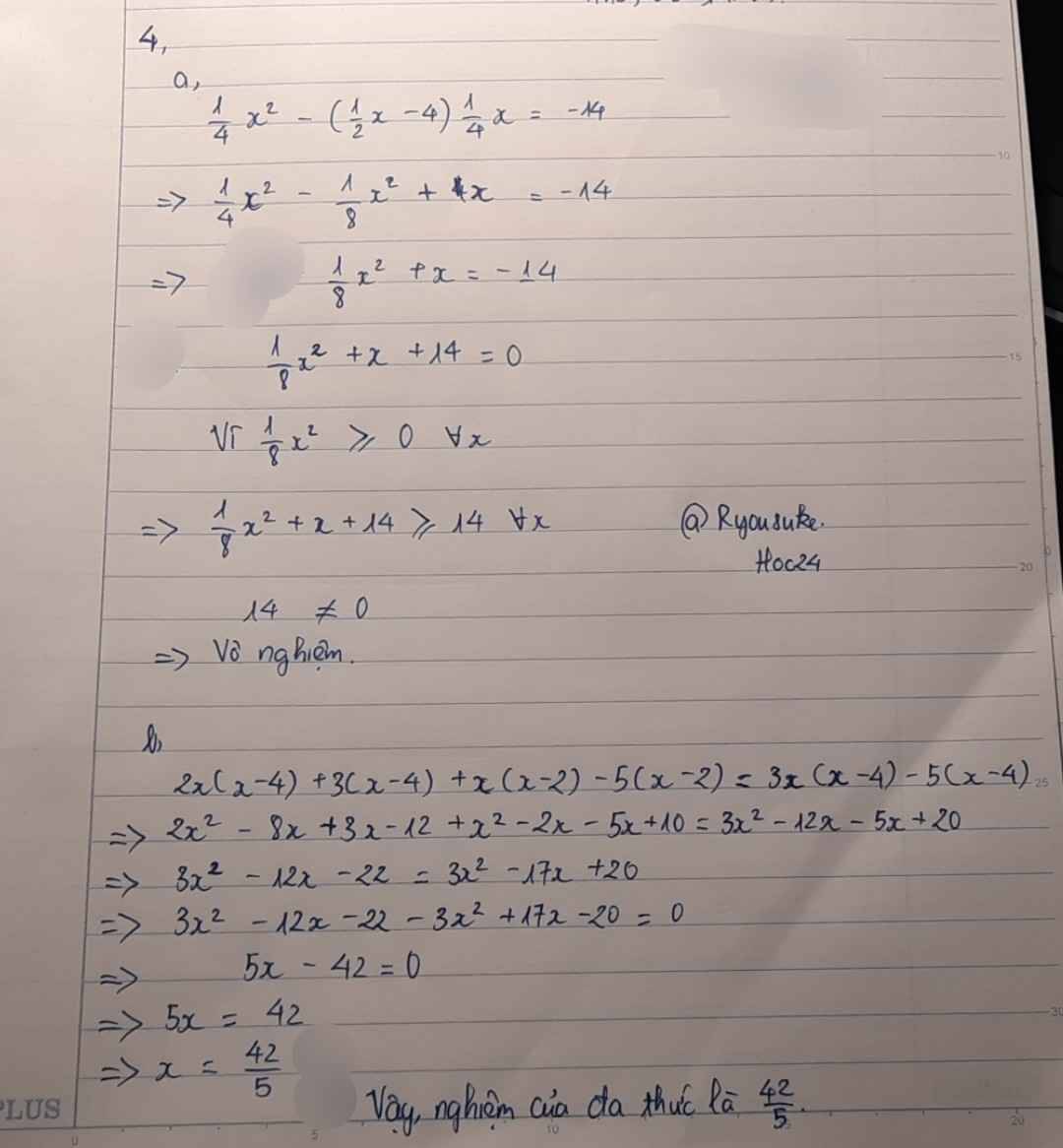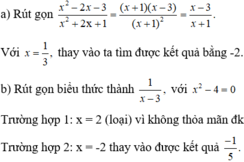giai phuong trinh (x2 + 3x-4)3 + (2x2-5x+3)3 = (3x2 -2x-1)3

Những câu hỏi liên quan
Bài 1: Thực hiện phép tínha)5x3(3x2 – 5x + 3) c)x2 ( 2x3 – 4x + 3)b) -1dfrac{1}{2}x22x – 1)(x2 + 5x – 4) d) (3x – 4)(2x + 4) + (5 – x)(2x2 + 3x – 2)
Đọc tiếp
Bài 1: Thực hiện phép tính
a)5x3(3x2 – 5x + 3) c)x2 ( 2x3 – 4x + 3)
b) -1\(\dfrac{1}{2}\)x22x – 1)(x2 + 5x – 4) d) (3x – 4)(2x + 4) + (5 – x)(2x2 + 3x – 2)
a: \(=15x^5-25x^4+15x^3\)
b: \(=2x^3+10x^2-8x-x^2-5x+4\)
\(=2x^3+9x^2-13x+4\)
Đúng 1
Bình luận (0)
Thực hiện phép tính:
a)2x(3x2 - 5x + 3) b)-2x2(x2 + 5x - 3) c)-1/2x2(2x3 - 4x + 3)
d) (2x - 1)(x2 +5- 4) c) 7x(x - 4) - (7x + 3)(2x2 - x + 4).
a: \(=6x^3-10x^2+6x\)
b: \(=-2x^4-10x^3+6x^2\)
c: \(=-x^5+2x^3-\dfrac{3}{2}x^2\)
d: \(=2x^3+10x^2-8x-x^2-5x+4=2x^3+9x^2-13x+4\)
Đúng 0
Bình luận (0)
giai bat phuong trinh sau: (5x-2/3)-(2x2 - x)/2 >= [x(1-3x)] /3 - (5x)/4
\(\left(5x-\frac{2}{3}\right)-\frac{2x^2-x}{2}\ge\frac{x\left(1-3x\right)}{3}-\frac{5x}{4}\)
<=> \(\frac{60x-8-6\left(2x^2-x\right)}{12}\ge\frac{4x\left(1-3x\right)-15x}{12}\)
<=> \(60x-8-12x^2+6x\ge4x-12x^2-15x\)
<=> \(47x\ge8\)
<=> \(x\ge\frac{8}{47}\)
Đúng 0
Bình luận (0)
Bài1: Thực hiện phép tính a) 2x(3x2 – 5x + 3) b) - 2x ( x2 + 5x+3) Bài 4: Tìm x, biết.a/ 3x + 2(5 – x) 0 b/ x(2x – 1)(x + 5) – (2x2 + 1)(x + 4,5) 3,5c/ 3x2 – 3x(x – 2) 36.II. PHÂN TÍCH ĐA THỨC THÀNH NHÂN TỬ Bài1: Phân tích đa thức thành nhân tử.a/ 14x2y – 21xy2 + 28x2y2 b/ x(x + y) – 5x – 5y.c/ 10x(x – y) – 8(y – x). d/ (3x + 1)2 – (x + 1)2e/ 5x2 – 10xy + 5y2 – 20z2. f/ x2 + 7x – 8g/ x3 – x + 3x2y + 3xy2 + y3 – y h/ x2 + 4x + 3.
Đọc tiếp
Bài1: Thực hiện phép tính
a) 2x(3x2 – 5x + 3) b) - 2x ( x2 + 5x+3)
Bài 4: Tìm x, biết.
a/ 3x + 2(5 – x) = 0 b/ x(2x – 1)(x + 5) – (2x2 + 1)(x + 4,5) = 3,5
c/ 3x2 – 3x(x – 2) = 36.
II. PHÂN TÍCH ĐA THỨC THÀNH NHÂN TỬ
Bài1: Phân tích đa thức thành nhân tử.
a/ 14x2y – 21xy2 + 28x2y2 b/ x(x + y) – 5x – 5y.
c/ 10x(x – y) – 8(y – x). d/ (3x + 1)2 – (x + 1)2
e/ 5x2 – 10xy + 5y2 – 20z2. f/ x2 + 7x – 8
g/ x3 – x + 3x2y + 3xy2 + y3 – y h/ x2 + 4x + 3.
Bài 1:
a: \(=6x^3-10x^2+6x\)
b: \(=-2x^3-10x^2-6x\)
Bài 4:
a: =>3x+10-2x=0
=>x=-10
c: =>3x2-3x2+6x=36
=>6x=36
hay x=6
Đúng 0
Bình luận (0)
Bài 1:
\(a,=6x^3-10x^2+6x\\ b,=-2x^3-10x^2-6x\)
Bài 4:
\(a,\Leftrightarrow3x+10-2x=0\Leftrightarrow x=-10\\ b,\Leftrightarrow x\left(2x^2+9x-5\right)-\left(2x^3+9x^2+x+4,5\right)=3,5\\ \Leftrightarrow2x^3+9x^2-5x-2x^3-9x^2-x-4,5=3,5\\ \Leftrightarrow-6x=8\Leftrightarrow x=-\dfrac{4}{3}\\ c,\Leftrightarrow3x^2-3x^2+6x=36\Leftrightarrow x=6\)
Bài 1:
\(a,=7xy\left(2x-3y+4xy\right)\\ b,=x\left(x+y\right)-5\left(x+y\right)=\left(x-5\right)\left(x+y\right)\\ c,=\left(x-y\right)\left(10x+8\right)=2\left(5x+4\right)\left(x-y\right)\\ d,=\left(3x+1-x-1\right)\left(3x+1+x+1\right)\\ =2x\left(4x+2\right)=4x\left(2x+1\right)\\ e,=5\left[\left(x-y\right)^2-4z^2\right]=5\left(x-y-2z\right)\left(x-y+2z\right)\\ f,=x^2+8x-x-8=\left(x+8\right)\left(x-1\right)\\ g,\left(x+y\right)^3-\left(x+y\right)=\left(x+y\right)\left[\left(x+y\right)^2-1\right]\\ =\left(x+y\right)\left(x+y-1\right)\left(x+y+1\right)\\ h,=x^2+3x+x+3=\left(x+3\right)\left(x+1\right)\)
Đúng 1
Bình luận (0)
Giải phương trình :
1) √x2+x+2 + 1/x= 13-7x/2
2) x2 + 3x = √1-x + 1/4
3) ( x+3)√48-x2-8x= 28-x/ x+3
4) √-x2-2x +48= 28-x/x+3
5) 3x2 + 2(x-1)√2x2-3x +1= 5x + 2
6) 4x2 +(8x - 4)√x -1 = 3x+2√2x2 +5x-3
7) x3/ √16-x2 + x2 -16 = 0
Bài 1: Rút gọn biểu thức sau:a. 3x2(2x3- x+5) - 6x5-3x3+10x2b. -2x(x3-3x2-xx+11)-2x4+3x3+2x2-22x2xBài 2: Chứng minh biểu thức sau không phụ thuộc vào x:a. x(2x+1)-x2(x+2)+(x2-x+3)b. 4(x-6)-x2(2+3x)+x(5x-4)+3x2(x-1)Bài 3: Cho đa thức: f(x)3x2-x+1 g(x)x-1a. Tính f(x).g(x)b. Tìm x để f(x).g(x)+x2[1-3g(x)]Bài 4: Tìm x:a. dfrac{1}{4}x2-(dfrac{1}{2}x-4)dfrac{1}{2}x-14b. 2x(x-4)+3(x-4)+x(x-2)-5(x-2)3x(x-4)-5(x-4)Các bạn giúp mik giải bt nha. Cảm ơn mn nhiêu ạ.
Đọc tiếp
Bài 1: Rút gọn biểu thức sau:
a. 3x2(2x3- x+5) - 6x5-3x3+10x2
b. -2x(x3-3x2-xx+11)-2x4+3x3+2x2-22x2x
Bài 2: Chứng minh biểu thức sau không phụ thuộc vào x:
a. x(2x+1)-x2(x+2)+(x2-x+3)
b. 4(x-6)-x2(2+3x)+x(5x-4)+3x2(x-1)
Bài 3: Cho đa thức: f(x)=3x2-x+1
g(x)=x-1
a. Tính f(x).g(x)
b. Tìm x để f(x).g(x)+x2[1-3g(x)]=
Bài 4: Tìm x:
a. \(\dfrac{1}{4}\)x2-(\(\dfrac{1}{2}\)x-4)\(\dfrac{1}{2}\)x=-14
b. 2x(x-4)+3(x-4)+x(x-2)-5(x-2)=3x
(x-4)-5(x-4)
Các bạn giúp mik giải bt nha. Cảm ơn mn nhiêu ạ.
`@` `\text {Ans}`
`\downarrow`
Gửi c!



Đúng 5
Bình luận (1)
Bài 1:
a) \(3x^2\left(2x^3-x+5\right)-6x^5-3x^3+10x^2\)
\(=6x^5-3x^3+10x^2-6x^5-3x^3+10x^2\)
\(=10x^2+10x^2\)
\(=20x^2\)
b) \(-2x\left(x^3-3x^2-x+11\right)-2x^4+3x^3+2x^2-22x\)
\(=-2x^4+6x^3+2x^2-22x-2x^4+3x^3+2x^2-22x\)
\(=-4x^4+9x^3+4x^2-44x\)
Đúng 0
Bình luận (2)
4:
a: =>1/4x^2-1/4x^2+2x=-14
=>2x=-14
=>x=-7
b: =>2x^2-8x+3x-12+x^2-2x-5x+10=3x^2-12x-5x+20
=>3x^2-12x-2=3x^2-17x+20
=>5x=22
=>x=22/5
Đúng 1
Bình luận (0)
Tính giá trị của phân thức:a)
x
2
−
2
x
−
3
x
2
+
2
x
+
1
với
x
≠
−
1
tại
3
x
−
1...
Đọc tiếp
Tính giá trị của phân thức:
a) x 2 − 2 x − 3 x 2 + 2 x + 1 với x ≠ − 1 tại 3 x − 1 = 0 ;
b) x − 2 x 2 − 5 x + 6 với x ≠ 2 ; x ≠ 3 tại x 2 − 4 = 0 .
Giải các phương trình tích sau:1.a)(3x – 2)(4x + 5) 0 b) (2,3x – 6,9)(0,1x + 2) 0c)(4x + 2)(x2 + 1) 0 d) (2x + 7)(x – 5)(5x + 1) 02. a)(3x + 2)(x2 – 1) (9x2 – 4)(x + 1) b)x(x + 3)(x – 3) – (x + 2)(x2 – 2x + 4) 0c)2x(x – 3) + 5(x – 3) 0 d)(3x – 1)(x2 + 2) (3x – 1)(7x – 10)3.a)(2x – 5)2 – (x + 2)2 0 b)(3x2 + 10x – 8)2 (5x2 – 2x + 10)2c)(x2 – 2x + 1) – 4 0 d)4x2 + 4x + 1 x24. a) 3x2 + 2x – 1 0 b) x2 – 5x + 6 0c) x2 – 3x + 2 0 d) 2x2 – 6x + 1 0 ...
Đọc tiếp
Giải các phương trình tích sau:
1.a)(3x – 2)(4x + 5) = 0 b) (2,3x – 6,9)(0,1x + 2) = 0
c)(4x + 2)(x2 + 1) = 0 d) (2x + 7)(x – 5)(5x + 1) = 0
2. a)(3x + 2)(x2 – 1) = (9x2 – 4)(x + 1)
b)x(x + 3)(x – 3) – (x + 2)(x2 – 2x + 4) = 0
c)2x(x – 3) + 5(x – 3) = 0 d)(3x – 1)(x2 + 2) = (3x – 1)(7x – 10)
3.a)(2x – 5)2 – (x + 2)2 = 0 b)(3x2 + 10x – 8)2 = (5x2 – 2x + 10)2
c)(x2 – 2x + 1) – 4 = 0 d)4x2 + 4x + 1 = x2
4. a) 3x2 + 2x – 1 = 0 b) x2 – 5x + 6 = 0
c) x2 – 3x + 2 = 0 d) 2x2 – 6x + 1 = 0
e) 4x2 – 12x + 5 = 0 f) 2x2 + 5x + 3 = 0
Bài 1:
a) (3x - 2)(4x + 5) = 0
<=> 3x - 2 = 0 hoặc 4x + 5 = 0
<=> 3x = 2 hoặc 4x = -5
<=> x = 2/3 hoặc x = -5/4
b) (2,3x - 6,9)(0,1x + 2) = 0
<=> 2,3x - 6,9 = 0 hoặc 0,1x + 2 = 0
<=> 2,3x = 6,9 hoặc 0,1x = -2
<=> x = 3 hoặc x = -20
c) (4x + 2)(x^2 + 1) = 0
<=> 4x + 2 = 0 hoặc x^2 + 1 # 0
<=> 4x = -2
<=> x = -2/4 = -1/2
d) (2x + 7)(x - 5)(5x + 1) = 0
<=> 2x + 7 = 0 hoặc x - 5 = 0 hoặc 5x + 1 = 0
<=> 2x = -7 hoặc x = 5 hoặc 5x = -1
<=> x = -7/2 hoặc x = 5 hoặc x = -1/5
bài 2:
a, (3x+2)(x^2-1)=(9x^2-4)(x+1)
(3x+2)(x-1)(x+1)=(3x-2)(3x+2)(x+1)
(3x+2)(x-1)(x+1)-(3x-2)(3x+2)(x+1)=0
(3x+2)(x+1)(1-2x)=0
b, x(x+3)(x-3)-(x-2)(x^2-2x+4)=0
x(x^2-9)-(x^3+8)=0
x^3-9x-x^3-8=0
-9x-8=0
tự tìm x nha
Đúng 0
Bình luận (0)
Bài 1: Rút gọn rồi tính giá trị biểu thức:a) A 4x2.(-3x2 + 1) + 6x2.( 2x2 – 1) + x2 khi x -1b) B x2.(-2y3 – 2y2 + 1) – 2y2.(x2y + x2) khi x 0,5 và y -1/2Bài 2: Tìm x, biết:a) 2(5x - 8) – 3(4x – 5) 4(3x – 4) +11b) 2x(6x – 2x2) + 3x2(x – 4) 8c) (2x)2(4x – 2) – (x3 – 8x2) 15Bài 3: Chứng tỏ rằng giá trị của biểu thức sau không phụ thuộc vào giá trị của biến x:P x(2x + 1) – x2(x+2) + x3 – x +3
Đọc tiếp
Bài 1: Rút gọn rồi tính giá trị biểu thức:
a) A = 4x2.(-3x2 + 1) + 6x2.( 2x2 – 1) + x2 khi x = -1
b) B = x2.(-2y3 – 2y2 + 1) – 2y2.(x2y + x2) khi x = 0,5 và y = -1/2
Bài 2: Tìm x, biết:
a) 2(5x - 8) – 3(4x – 5) = 4(3x – 4) +11
b) 2x(6x – 2x2) + 3x2(x – 4) = 8
c) (2x)2(4x – 2) – (x3 – 8x2) = 15
Bài 3: Chứng tỏ rằng giá trị của biểu thức sau không phụ thuộc vào giá trị của biến x:
P = x(2x + 1) – x2(x+2) + x3 – x +3
\(1,\\ a,A=4x^2\left(-3x^2+1\right)+6x^2\left(2x^2-1\right)+x^2\\ A=-12x^4+4x^2+12x^2-6x^2+x^2=-x^2=-\left(-1\right)^2=-1\\ b,B=x^2\left(-2y^3-2y^2+1\right)-2y^2\left(x^2y+x^2\right)\\ B=-2x^2y^3-2x^2y^2+x^2-2x^2y^3-2x^2y^2\\ B=-4x^2y^3-4x^2y^2+x^2\\ B=-4\left(0,5\right)^2\left(-\dfrac{1}{2}\right)^3-4\left(0,5\right)^2\left(-\dfrac{1}{2}\right)^2+\left(0,5\right)^2\\ B=\dfrac{1}{8}-\dfrac{1}{4}+\dfrac{1}{4}=\dfrac{1}{8}\)
Đúng 3
Bình luận (0)
\(2,\\ a,\Leftrightarrow10x-16-12x+15=12x-16+11\\ \Leftrightarrow-14x=-4\\ \Leftrightarrow x=\dfrac{2}{7}\\ b,\Leftrightarrow12x^2-4x^3+3x^3-12x^2=8\\ \Leftrightarrow-x^3=8=-2^3\\ \Leftrightarrow x=2\\ c,\Leftrightarrow4x^2\left(4x-2\right)-x^3+8x^2=15\\ \Leftrightarrow16x^3-8x^2-x^3+8x^2=15\\ \Leftrightarrow15x^3=15\\ \Leftrightarrow x^3=1\Leftrightarrow x=1\)
Đúng 3
Bình luận (0)
\(P=x\left(2x+1\right)-x^2\left(x+2\right)+x^3-x+3\\ P=2x^2+x-x^3-2x^2+x^3-x+3\\ P=3\left(đfcm\right)\)
Đúng 2
Bình luận (0)
Xem thêm câu trả lời






















